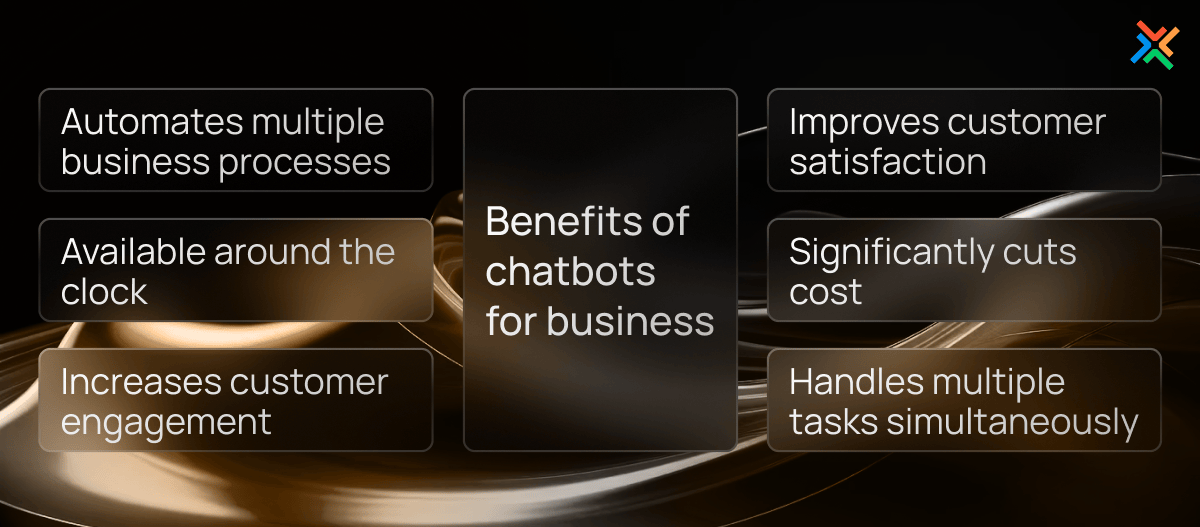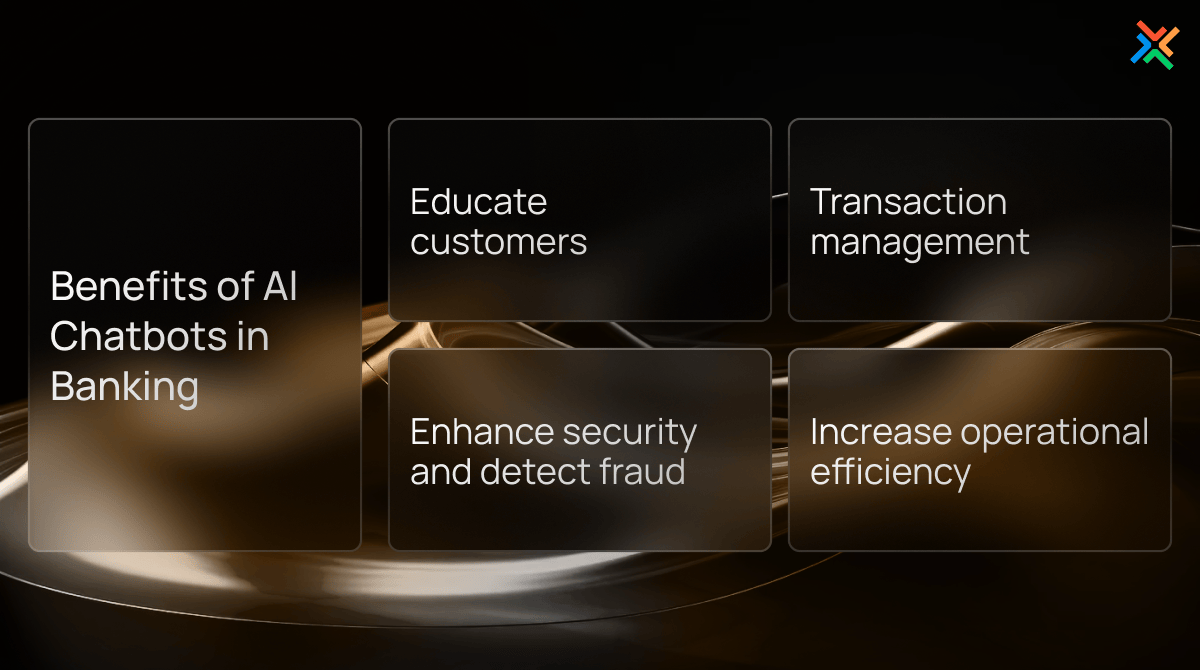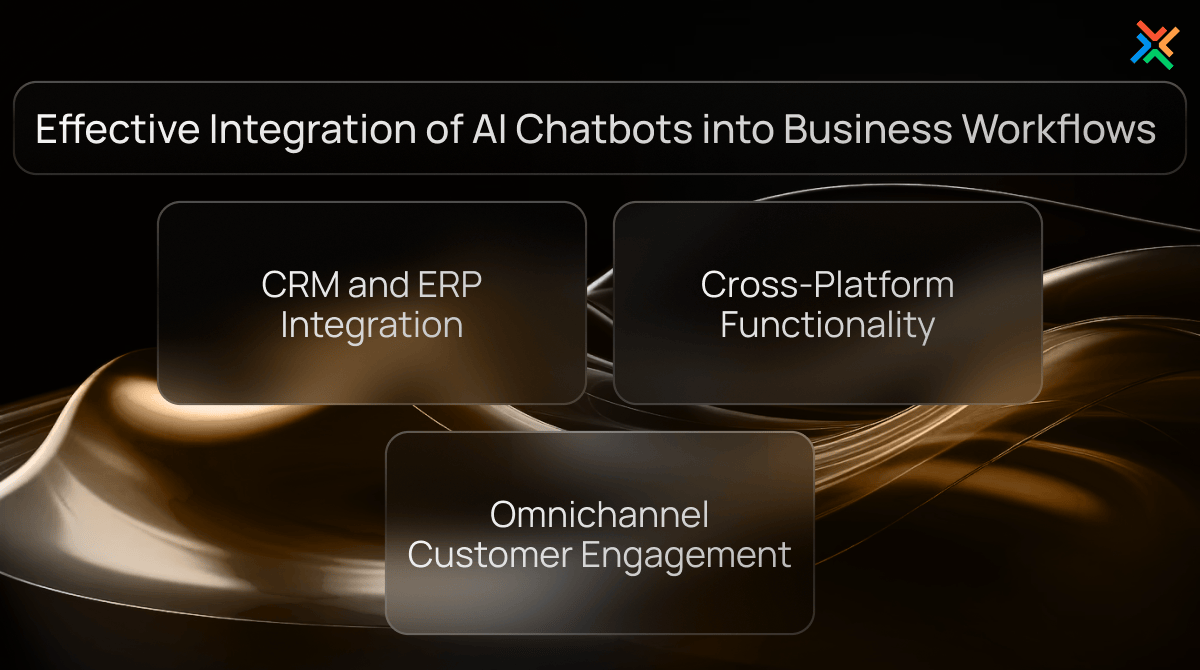The Benefits of Integrating AI-Powered Chatbots into Your Business
October 14, 2024

Ayush Kanodia

AI-powered chatbots have come a long way from the early days of basic scripted bots. Back then, interactions were limited to following a predefined script, often leaving users frustrated when the conversation veered off course. Fast forward to today, chatbots have become highly intelligent, conversational agents that can handle complex queries with ease.
The key drivers behind this transformation are advancements in Natural Language Processing (NLP) and machine learning. These technologies allow chatbots to understand context, learn from past interactions, and respond more naturally, making them much more than just automated response systems. They can now engage with customers in meaningful ways, handle a wide range of tasks, and adapt to user preferences.
For businesses, integrating AI-powered chatbots by collaborating with a trusted chatbot development company in the UAE isn’t just about keeping up with technology trends. It’s about creating smoother workflows, reducing operational strain, and providing faster, more efficient customer service. In short, chatbots have become essential tools that optimize operations while improving customer experiences across various industries.
Understanding the Core Technology Behind AI Chatbots
To understand how AI chatbots work, it’s essential to look at the core technologies that drive them. Three key components play a critical role in making chatbots as effective and intelligent as they are today - Natural Language Processing (NLP), machine learning (ML), and API integrations.
Natural Language Processing (NLP)
NLP governs how chatbots interpret and respond to human language. At its core, NLP allows chatbots to analyze the structure of sentences, understand the context, and figure out what users really mean—beyond just the words they use. This isn’t just about simple keyword recognition; it’s about interpreting intent, tone, and even emotional cues in a conversation.
For example, when a customer asks, “Can I reschedule my delivery?” the chatbot doesn’t just see the word “delivery” and send a stock response. Instead, it breaks down the sentence, identifies the action being requested (rescheduling), and responds accordingly. This ability to comprehend and respond naturally makes chatbots more effective in handling varied queries.
Machine Learning (ML) Algorithms
Machine learning is what helps chatbots get better over time. Through continuous data analysis, chatbots can learn from every interaction they have. This means that they don’t just follow pre-set rules—they adapt based on patterns in user behavior and refine their responses accordingly.
Let’s say a chatbot gets asked the same question in slightly different ways: “How do I update my profile?” vs. “Can I change my account info?” Over time, ML helps the chatbot recognize that both queries have the same underlying intent, so it can respond accurately regardless of phrasing. This continuous learning process is what makes AI chatbots so powerful, as they become more accurate and efficient the more they’re used.
Integrating with APIs and Platforms
A chatbot’s real potential comes from its ability to work within a broader ecosystem. By integrating with various APIs and platforms—like CRM systems, ERP tools, and even social media—chatbots can automate tasks, pull in relevant data, and offer more personalized responses.
For instance, a chatbot integrated with a CRM can instantly access a customer’s previous interactions and provide context-aware responses. If integrated with social media, it can offer customer support directly through platforms like Facebook Messenger or Twitter, delivering an effective customer experience across channels.
Business Benefits of AI-Powered Chatbots
Integrating AI-powered chatbots into your business brings tangible benefits that impact both operations and customer experience.

24/7 Availability and Customer Support Automation
One of the most immediate benefits of chatbots is their ability to handle routine customer queries around the clock. Whether it’s answering simple questions like “What are your operating hours?” or helping users navigate product options, chatbots never need a break. This level of availability allows businesses to maintain a consistent customer service presence without overloading their human support team. For routine, repetitive tasks, chatbots free up agents to focus on more complex or sensitive issues, ultimately improving service efficiency.
Data-Driven Personalization
AI chatbots aren’t just automated response systems—they can provide highly personalized interactions based on user history. By analyzing past interactions, purchase behavior, and preferences, chatbots can offer recommendations or solutions that are specific to each customer. For instance, a chatbot assisting in an online store can recommend products based on previous purchases or browsing habits, making the experience feel more customized and relevant. This level of personalization not only improves customer satisfaction but also drives engagement and, often, sales.
Cost Efficiency and Scalability
From a business perspective, chatbot development services in the UAE are an investment that pays off in the long run. Automating customer interactions considerably reduces the need for large support teams, cutting down staffing costs without compromising service quality. Chatbots are also highly scalable—whether your business has 100 or 10,000 customer queries a day, a chatbot can handle the load without requiring extra resources. This flexibility is particularly valuable for businesses experiencing growth or seasonal spikes in demand, as it allows you to manage customer interactions without the cost and time associated with scaling a human support team.
Real-Time Data Analytics
AI-powered chatbots are more than just customer-facing tools; they are also valuable sources of real-time data. Every interaction provides actionable insights into customer behavior, preferences, and frequently asked questions. Businesses can analyze this data to identify trends, make informed decisions, and refine their strategies. For example, if a specific issue repeatedly surfaces in customer queries, a business can proactively address it, improving both products and services. This real-time feedback loop helps businesses stay agile and responsive to changing customer needs.
By implementing AI-powered chatbots, businesses gain a reliable, scalable, and cost-efficient solution that improves customer service and optimizes operations. At WDCS, we offer custom chatbot development services in the UAE that maximize these benefits, ensuring they are a perfect fit for your specific needs.
Advanced Use Cases of AI-Powered Chatbots Across Industries
AI chatbot development companies have found their way into various industries, providing practical solutions that go far beyond customer service. Here are a few examples of how different sectors are using chatbots.
Healthcare
Appointment Booking, Patient Queries, and Symptom Checking
In healthcare, AI chatbots are helping patients schedule appointments, answer common health-related questions, and even check symptoms based on predefined medical data. Patients can quickly book appointments with the right doctor or department, reducing the load on administrative staff. Some chatbots are also capable of providing preliminary advice based on a user’s symptoms, directing them to seek medical care if necessary. This approach not only saves time for both patients and healthcare providers but also facilitates quicker and more efficient communication.
Retail and E-commerce
Personalized Product Recommendations, Handling Returns, and Managing Inventories
In the retail and e-commerce space, chatbots are transforming the shopping experience by offering personalized product recommendations based on customer preferences and past behaviors. They can also handle routine tasks such as processing returns or exchanges, providing real-time inventory updates, and tracking orders. For businesses, this means fewer errors in order management and a smoother customer experience. Chatbots help maintain a consistent level of service, even during peak sales periods, by handling multiple customer queries simultaneously.
Banking and Finance
Fraud Detection, Transaction Monitoring, and Instant Customer Support
AI-based chatbot development services in the banking and finance industry are handling more than just basic account inquiries. They are capable of monitoring transactions in real time to detect any suspicious activity, helping prevent fraud. Additionally, chatbots offer instant support for common banking tasks such as checking balances, transferring funds, or setting up bill payments. By automating these processes, banks reduce operational costs and improve service reliability while offering secure, efficient customer interactions.

Logistics
Real-Time Tracking, Support Queries, and Dynamic Supply Chain Management
Logistics companies rely heavily on chatbots for real-time tracking of shipments and answering support queries related to deliveries. Customers can get instant updates on their packages, reducing the need for human intervention. Apart from customer support, chatbots can also assist in dynamic supply chain management by providing real-time inventory data and coordinating between different stakeholders. This helps logistics firms keep their operations running smoothly while maintaining high levels of customer satisfaction.
Effective Integration of AI Chatbots into Business Workflows
AI-powered chatbots are not standalone tools; their real value comes from how well they integrate with the systems and platforms businesses already use. By fitting into existing workflows, chatbots can improve efficiency across various departments.

CRM and ERP Integration
One of the most impactful ways chatbots can be integrated into business processes is through CRM (Customer Relationship Management) and ERP (Enterprise Resource Planning) systems. Chatbots can automate many tasks, from logging customer interactions to pulling up detailed data on customer profiles, purchase history, or ongoing deals. For example, a chatbot connected to a CRM system can instantly provide sales teams with key customer insights, reducing the need for manual searches. In ERP systems, chatbots can assist with inventory management, order tracking, or generating reports, making processes faster and more accurate.
Cross-Platform Functionality
Another advantage of AI-driven chatbots is their ability to function effectively across multiple platforms. Whether customers engage through your website, mobile app, or social media, chatbots can provide a consistent experience. This cross-platform functionality means users can interact with your business on their preferred channel, while your chatbot maintains the same level of service. Whether it’s answering queries, processing orders, or assisting with support issues, chatbots provide users with what they need without switching platforms or repeating their requests.
Omnichannel Customer Engagement
Chatbots are also adept at creating a unified customer experience across all communication channels. Whether a customer reaches out via email, social media, or through your website's live chat, the chatbot can recognize the user, access their interaction history, and offer a personalized response. This omnichannel approach means the conversation flows smoothly across different touchpoints, providing a more cohesive and efficient customer experience. Businesses benefit by providing better service without needing to allocate extra resources to manage multiple channels manually.
Security and Privacy Concerns with AI Chatbots
When it comes to implementing AI chatbots, security and privacy are two major areas businesses can’t afford to overlook. Since chatbots often handle sensitive customer information, it is critical that they are secure and compliant with data regulations.
Data Encryption and Compliance
One of the main security challenges around chatbots is the transmission and storage of customer data. To secure this information, chatbots rely on advanced encryption techniques. Encryption works by converting data into a code that can only be deciphered by authorized parties, ensuring that sensitive information such as personal details or payment credentials remains secure during exchanges. Businesses must adopt these encryption standards to protect customer data and maintain trust in their chatbot systems.
GDPR and Data Privacy
Data compliance is another key concern, especially for businesses operating in regions governed by regulations like GDPR (General Data Protection Regulation). Chatbots need to be designed with data privacy in mind, which means they must collect, store, and process customer information in compliance with these regulations. This includes obtaining explicit consent from users before collecting their data, as well as giving them the option to delete or review their information. By having the chatbots adhere to these privacy standards, businesses can avoid legal risks while maintaining transparency with their customers.
Fraud Detection
AI chatbots are not just helpful in customer service—they can also play a noteworthy role in fraud detection. Chatbots equipped with AI algorithms can monitor real-time transactions, flagging any suspicious activities or inconsistencies in user behavior. For example, if a user suddenly starts making unusual requests or changes to their account, the chatbot can detect these anomalies and alert the system to take precautionary measures. This proactive approach helps businesses prevent fraud before it escalates, protecting both the company and its customers.
AI-Powered Chatbots and the Future of Business Automation
Emerging technologies and trends are pushing chatbots toward more sophisticated roles in business automation, opening up new opportunities for companies that adopt these advanced capabilities.
Predictive AI and Future Trends
One of the most exciting trends in chatbot development is the use of predictive analytics. With predictive AI, chatbots can analyze user behavior patterns and forecast future needs or actions. For instance, a chatbot could predict when a customer might need to reorder a product based on past purchases or identify potential issues before they arise, offering proactive support. Furthermore, emotion recognition is gaining traction, where chatbots can detect and respond to a user’s emotional tone, adjusting their responses to be more empathetic or supportive.
Looking ahead, chatbots will also play a bigger role in autonomous decision-making. By analyzing real-time data and using predefined business rules, chatbots could make low-level decisions without needing human intervention, optimizing workflows even further.
AI Chatbots and the Role of Human-AI Collaboration
While AI chatbots are becoming more advanced, they’re not about to replace the human workforce. Instead, they’re designed to complement human roles by handling repetitive, mundane tasks, allowing employees to focus on more complex and value-driven activities. For example, in a customer service setting, a chatbot can handle basic queries while human agents deal with more nuanced issues that require judgment or a personal touch. This kind of collaboration boosts overall efficiency and puts human skills to use where they matter most.
At WDCS, we’re already working on integrating these advanced features into our chatbot solutions. By staying ahead of trends like predictive AI and emotion recognition, we help businesses automate more effectively and create systems where AI and human teams work hand-in-hand. Whether it’s about improving customer experience or optimizing internal processes, we’re positioned as a forward-thinking partner that can guide businesses into the future of AI-driven automation.
Why Choose AI-based Chatbot Development Services from WDCS?
At WDCS, we bring deep technical expertise and a proven track record in building AI-powered chatbot solutions that fit perfectly into your business. Our approach to chatbot development is grounded in understanding your unique needs and delivering solutions that are customizable, scalable, and packed with advanced features.
Our Development Process
We take a structured approach to chatbot development, starting with a detailed assessment of your business requirements. From there, we design and build chatbots using the latest in Natural Language Processing (NLP) and Machine Learning (ML) technologies. Our chatbots are designed to handle complex queries, adapt to user behavior, and integrate into your existing systems, whether it’s a CRM, ERP, or custom platform. We also build our chatbots to be scalable, so they can grow alongside your business.
What Makes WDCS Different?
Our unique selling points lie in the flexibility and depth of our solutions. We don’t offer off-the-shelf products. Instead, we build chatbots that are fully customizable to your specific business needs, ensuring they can handle the tasks that matter most to you. Our advanced NLP and ML capabilities allow for smarter, more intuitive interactions, providing your users with a better overall experience. Additionally, our expertise in system integrations means your chatbot will fit efficiently into your existing workflow
Develop a custom chatbot solution with our team of AI experts at WDCS.
With years of experience in natural language processing and machine learning, at WDCS, we can build a chatbot that understands your customers and provides accurate, helpful responses.